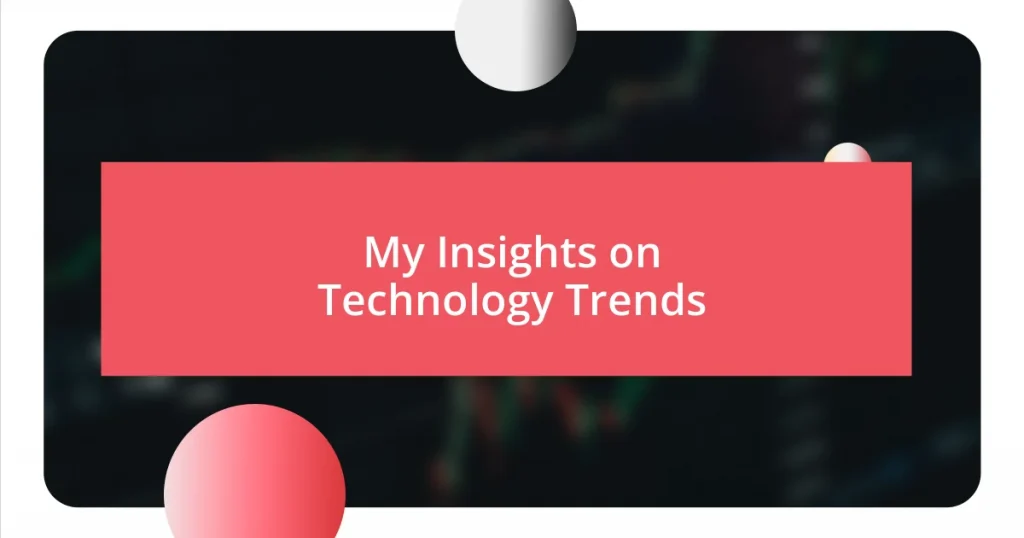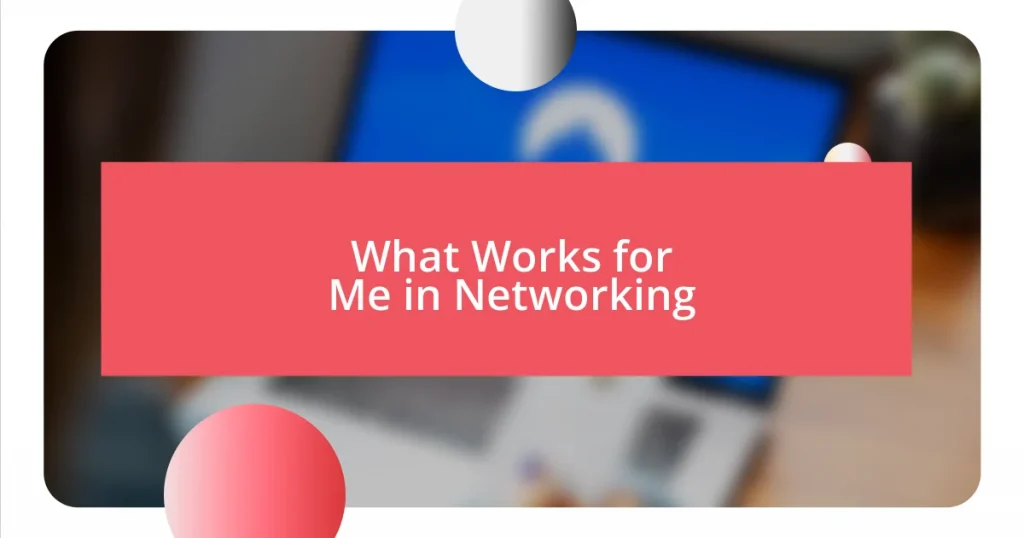Key takeaways:
- The rise of AI enhances operational efficiency in businesses, transforming customer service and recruitment while demanding skill adaptation from the workforce.
- Proactive cybersecurity measures are essential for protecting personal information, including strong passwords, two-factor authentication, and awareness of phishing scams.
- Future technology trends like augmented reality, quantum computing, and 5G hold potential for transformative impacts on remote work, problem-solving, and urban living.
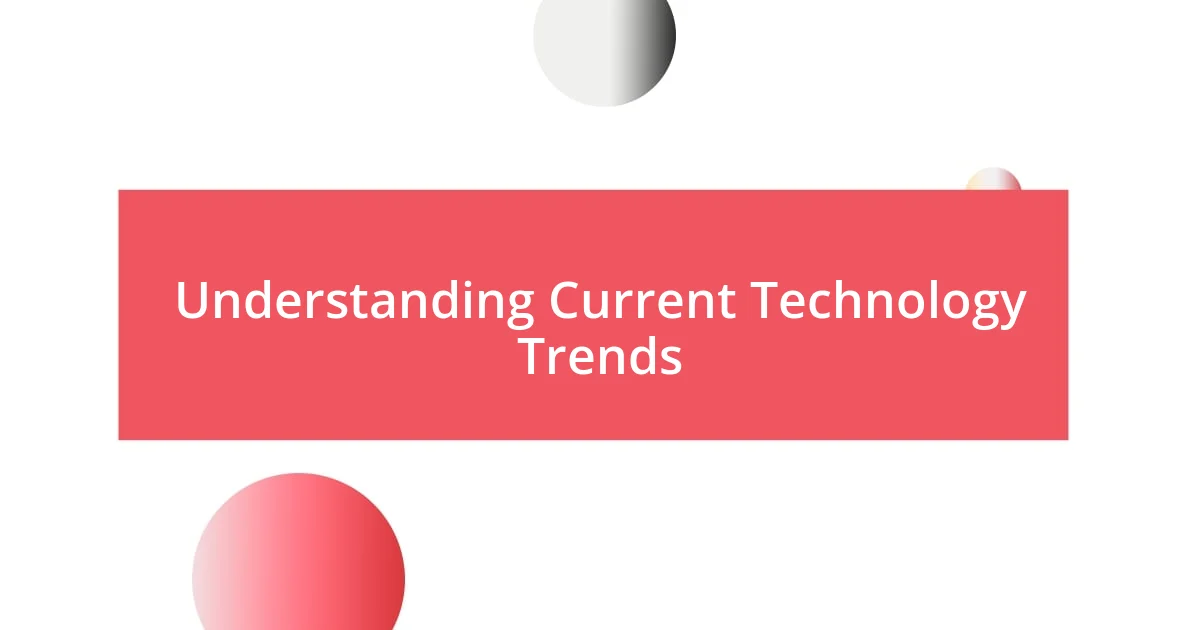
Understanding Current Technology Trends
Understanding current technology trends can feel overwhelming, but it’s essential for anyone looking to stay relevant in today’s fast-paced world. I remember when I first encountered AI tools that could create content almost effortlessly; I found myself both fascinated and slightly intimidated. Have you ever wondered how these advancements could change our daily lives?
As I delve deeper into the realm of technology trends, I’ve seen that the rise of remote work tools has transformed not just how we work, but where we work. I recall a conversation with a friend who embraced remote work fully, realizing how technology can offer freedom—he now works from a beach in Bali! Isn’t it amazing how tech has reshaped our opportunities and lifestyles?
Another trend that captivates me is the surge in sustainability-focused innovations. I once attended a tech conference where startups showcased eco-friendly tech solutions, like biodegradable phone cases or solar-powered gadgets. It struck me then: are we finally merging convenience with conscious living? The blend of technology and sustainability not only addresses environmental concerns but also sparks excitement about our future.
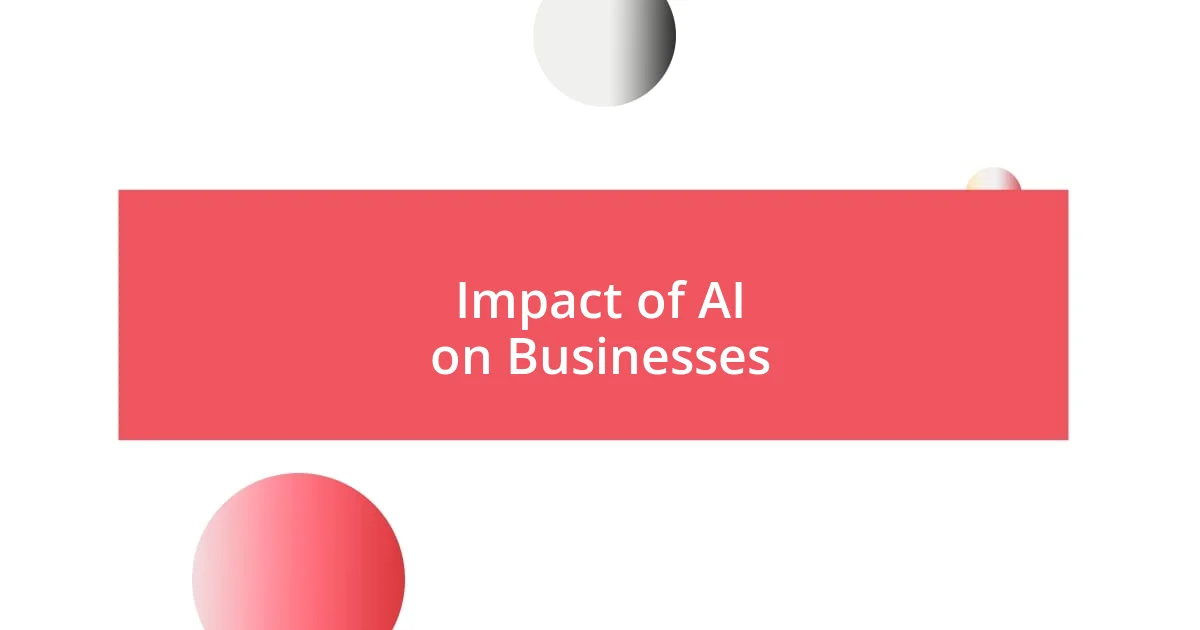
Impact of AI on Businesses
The integration of AI into businesses has revolutionized operational efficiency. I remember helping a small business implement an AI-driven customer service tool. The owner was initially skeptical, fearing that it would replace personal interactions. Yet, he saw how AI handled routine inquiries, allowing his team to focus on more complex issues—improving both employee satisfaction and customer experience. Isn’t it exciting to witness such transitions?
Furthermore, AI’s ability to analyze vast amounts of data offers businesses insights that were previously unimaginable. I can’t help but think of a marketing manager I spoke with who used AI tools to tailor campaigns based on real-time consumer behavior. The precision of targeting significantly increased their return on investment. Don’t you agree that transforming raw data into actionable strategies can be a game-changer?
Finally, there’s the aspect of job transformation due to AI. I vividly remember a discussion with a tech-savvy HR professional who shared how AI is reshaping recruitment. With AI screening resumes, the hiring process becomes quicker and more accurate. However, it does raise an important question: how do we adapt our skills to remain relevant in this evolving landscape?
| AI Impact on Businesses | Examples |
|---|---|
| Operational Efficiency | Customer service automation saves time and allows staff to engage in meaningful interactions. |
| Data Analysis | Real-time analytics drive targeted marketing strategies and improved ROI. |
| Job Transformation | AI streamlines recruitment but necessitates skill adaptation among the workforce. |
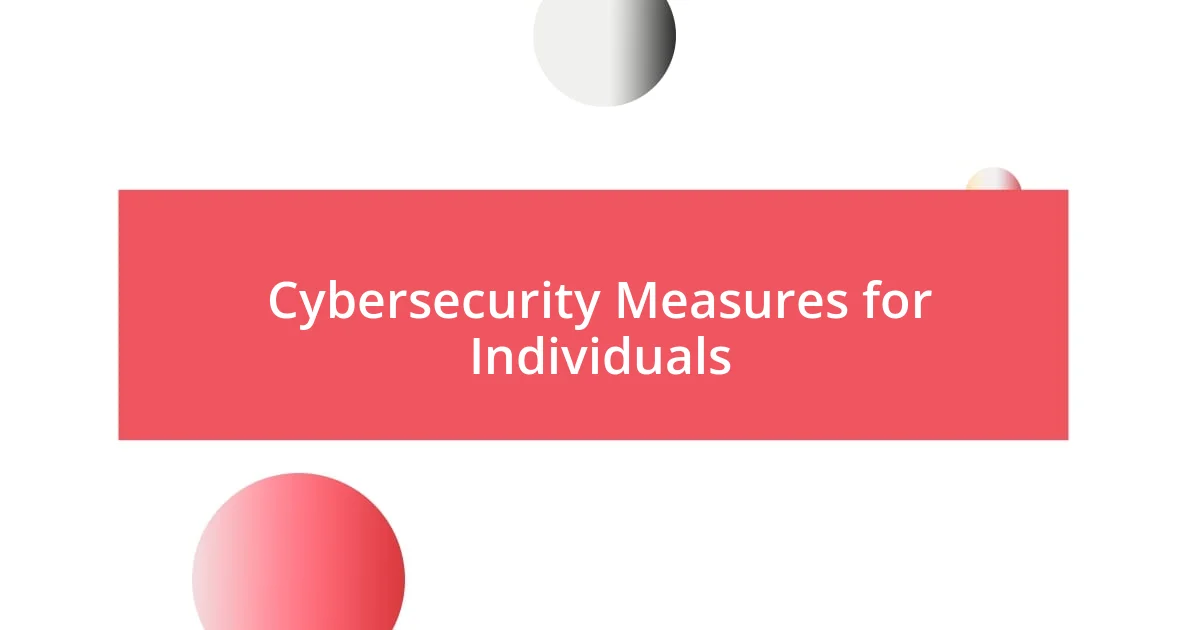
Cybersecurity Measures for Individuals
When it comes to cybersecurity measures, I’ve come to realize how vital it is for individuals to take proactive steps in protecting their online presence. A few years back, I fell victim to a phishing scam that left me scrambling to secure my accounts. The experience was eye-opening; it drove home the importance of being vigilant about personal cybersecurity. While it’s easy to assume that nothing bad will happen to us, a single moment of complacency can lead to significant consequences.
Here are some practical measures everyone should consider:
- Use Strong, Unique Passwords: Create complex passwords with a mix of letters, numbers, and symbols. I use a password manager to keep track of them because remembering every single one can be a headache.
- Enable Two-Factor Authentication (2FA): Whenever possible, opt for this extra layer of security. I started using 2FA on my email and banking accounts, and it gives me peace of mind.
- Be Cautious with Public Wi-Fi: I learned the hard way not to access sensitive information while connected to public networks; a VPN can be a lifesaver in those scenarios.
- Regular Software Updates: Keeping devices updated is crucial. I noticed that my phone tends to run smoother and is more secure when I prioritize these updates.
- Educate Yourself About Phishing Scams: Awareness is key. Once, I almost clicked on a link that looked legitimate; knowing what to watch out for has since kept me safer online.
By incorporating these measures into your daily routine, you can significantly enhance your cybersecurity and protect your personal information. Trust me; it’s worth the effort!
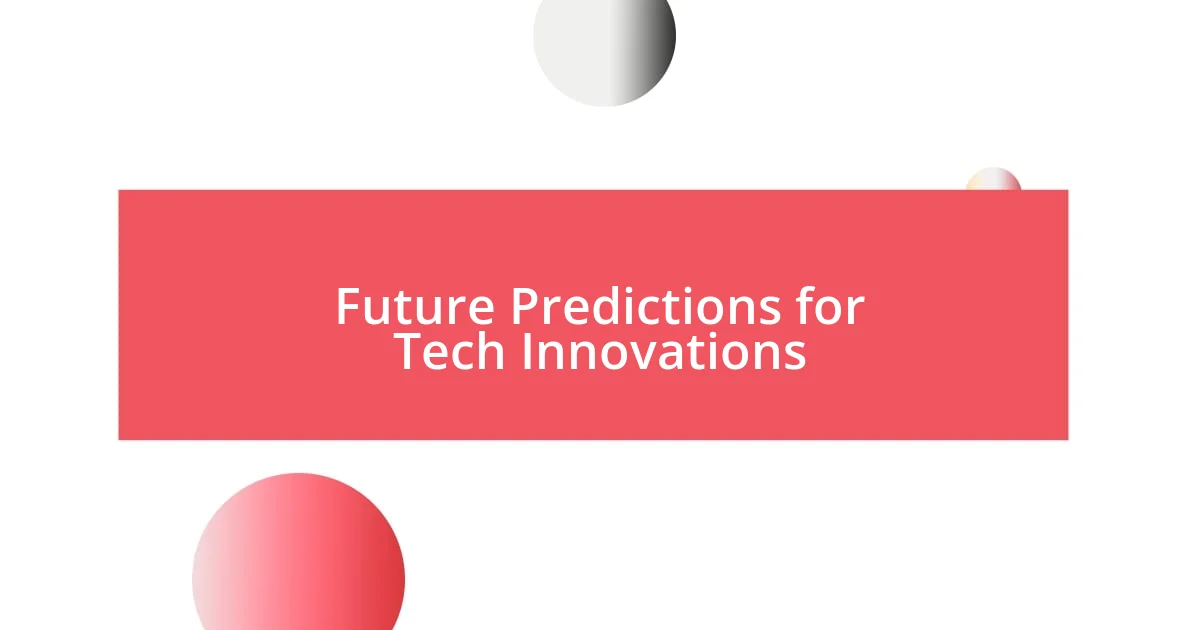
Future Predictions for Tech Innovations
As I look toward the horizon of tech innovations, I’m particularly fascinated by the rapid evolution of augmented reality (AR) and virtual reality (VR). I recently attended a conference where a startup presented their AR application designed for remote collaboration. It truly amazed me how their technology enabled people from different parts of the world to interact as if they were in the same room. Can you imagine how this could change the way businesses conduct training or host meetings?
Additionally, I foresee significant advancements in quantum computing. A colleague of mine, who works in research, shared how quantum computers can process information at speeds beyond our current capabilities. This innovation could open doors to solving complex problems unimaginable today. Isn’t it thrilling to think that solutions to climate change or medical mysteries might be just around the corner?
Lastly, consider the implications of 5G technology on smart cities. The potential for seamless connectivity not only enhances daily life but also promotes a sustainable future. I often think about how smart traffic management systems could drastically reduce congestion in cities, an issue that frustrates so many of us. Isn’t it exciting to envision a future where technology works harmoniously with our urban environments?
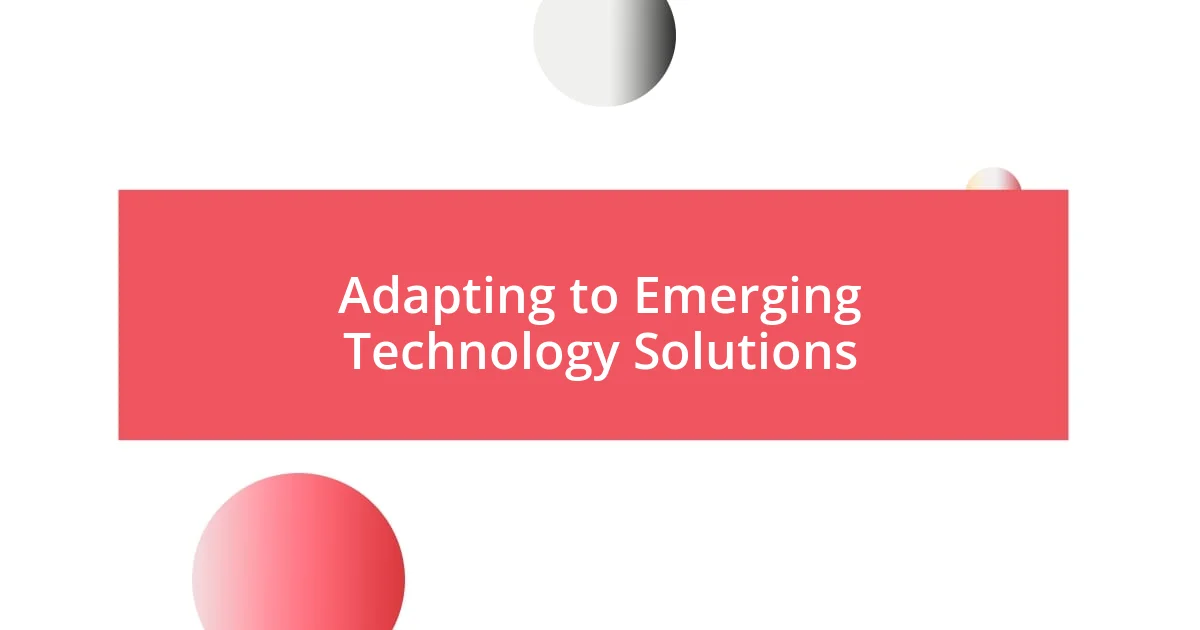
Adapting to Emerging Technology Solutions
Adapting to new technology solutions can feel overwhelming at times. I remember when cloud computing first started gaining popularity; it seemed like everyone was jumping on board, but I hesitated. It took some serious encouragement from a tech-savvy friend, who shared his positive experiences with platforms like Google Drive and Dropbox, to help me embrace this shift. The transition wasn’t just about using new tools; it was about redefining how I approached collaboration and accessibility.
I’ve found that the key to adapting is a willingness to learn. During my journey of getting to grips with technologies like artificial intelligence, I took an online course that opened my eyes to its potential applications. It felt almost surreal to see how AI can enhance productivity by automating mundane tasks. I often ask myself: if I can harness these innovations, what could I achieve? It’s a thought that keeps me motivated and excited about the future.
Moreover, change isn’t just about technical skills; it involves a mindset shift, too. I recall a project where we integrated a new project management tool that transformed our workflow. Initially, there was resistance from my team, but once they saw its ease of use and the improvements in tracking our progress, the skepticism faded. How often do we hold back just because we fear the unknown? Embracing emerging technology is as much about overcoming those fears as it is about the tools themselves.










